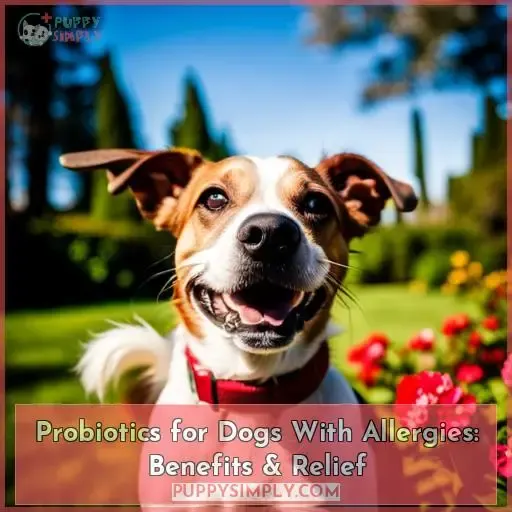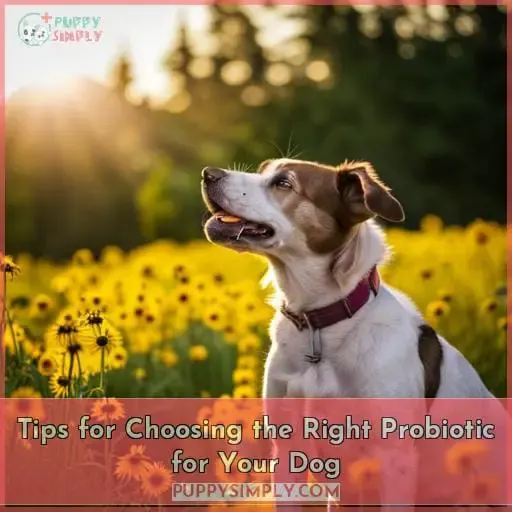This site is supported by our readers. We may earn a commission, at no cost to you, if you purchase through links.
 As pet owners, we want nothing more than to give our furry friends the best life possible. We try to provide them with the highest quality food and supplements available – but when it comes to allergies, this can be a bit of an uphill battle.
As pet owners, we want nothing more than to give our furry friends the best life possible. We try to provide them with the highest quality food and supplements available – but when it comes to allergies, this can be a bit of an uphill battle.
Probiotics for dogs with allergies are one way you can support your pup’s health while providing relief from their symptoms: enter Pupper Absorb! This probiotic powder is formulated specifically for pups who suffer from environmental or food-related allergies.
It contains natural ingredients like turmeric, quercetin, and bromelain that offer anti-inflammatory properties plus antioxidant protection against free radical damage caused by air pollutants.
With regular use of Pupper Absorb probiotic supplement, your pup will experience fewer allergy flare-ups as well as improved overall gut health.
Table Of Contents
- Key Takeaways
- How Probiotics Help With Dog Allergies
- Considerations When Choosing a Probiotic for Dogs
- The Benefits of Probiotics for Dogs With Allergies
- How to Use Probiotics for Dogs With Allergies
- Tips for Choosing the Right Probiotic for Your Dog
- Common Challenges in Managing Dog Allergies
- Customer Reviews and Testimonials
- Conclusion
Key Takeaways
- Probiotics can help reduce allergy flare-ups and improve gut health in dogs with allergies.
- Look for probiotics with strains like Lactobacillus and Bifidobacterium, and aim for at least 10 billion CFUs per serving.
- Probiotics work best when combined with other allergy treatments prescribed by your vet, such as antihistamines.
- It can take weeks or months to see the full benefits, so patience and consistency are important when giving your dog probiotics.
How Probiotics Help With Dog Allergies
You may be surprised to learn that probiotics can help with your dog’s allergies. By promoting a healthy balance of gut bacteria and targeting allergy relief with specific ingredients, probiotics offer an innovative solution for managing canine allergies.
Promoting a Healthy Balance of Gut Bacteria
Promoting a Healthy Balance of Gut Bacteria
Promoting a healthy balance of gut bacteria can give your furry friend relief from their allergies. Selecting high-quality probiotics tailored for dogs enhances their gut microbiome, nourishing good bacteria to ease allergy symptoms.
Probiotics support healthy digestion, nutrient absorption, and immunity while mitigating inflammatory response and strengthening the intestinal barrier. When selecting probiotics, consider the strains, CFU count, and formulation. It’s best to consult your veterinarian for probiotic guidance to manage Fido’s allergies.
Targeting Allergy Relief With Specific Ingredients
You’re better off choosing a probiotic that contains ingredients specifically formulated to target allergy relief in your furry friend. Look for probiotics with bromelain, an enzyme from pineapples that reduces inflammation.
Turmeric is another anti-inflammatory that can ease allergy symptoms. Some probiotics also contain antioxidants like quercetin to support immune function. Carefully selecting probiotics with research-backed ingredients tailored to allergy relief will provide noticeable improvements in your dog’s skin health and digestive support.
Considerations When Choosing a Probiotic for Dogs
As an animal health expert, I recommend carefully evaluating several key factors when selecting a probiotic supplement for your dog with allergies. First, look at the strains of bacteria and CFU counts, as certain strains like Lactobacillus acidophilus provide immune support while others aid digestion.
Also consider the supplement form – powders, capsules or flavored chews – and any additional ingredients like prebiotics or omega fatty acids that can further help relieve allergies.
The flavor is important too, since dogs can be picky, and you’ll want to find a supplement they enjoy. With the right probiotic matched to your dog’s needs, you’ll see improvements in their allergies, skin, coat and overall health.
Bacteria Strains and CFUs
You’ll want probiotics with lots of CFUs for optimal allergy relief. Look for multi-strain formulas with bacteria like Lactobacillus, Bifidobacterium, Streptococcus, and Enterococcus. These good bacteria help regulate your dog’s immune response. Higher CFU counts indicate more probiotics.
Aim for at least 10 billion CFUs per serving. This boosts healthy gut flora to ease allergy symptoms like itching and digestive issues. Probiotics won’t cure allergies, but can provide support alongside other treatments.
Supplement Form
You’d want soft chews over powders for easier dosing and administration.
Capsules can be difficult for dogs to swallow. Soft chews are more palatable. Look for natural flavors like chicken or beef added for palatability. Consider the bacterial strains and CFU count. Reputable brands with quality ingredients and safe manufacturing processes matter most.
Choose a supplement form such as chews that your dog enjoys for long-term immune support.
Added Ingredients
When choosing a probiotic for dogs with allergies, be sure to check the added ingredients as over 70% contain natural flavors like bacon, liver, or chicken for increased palatability.
For ingredient analysis and allergy management, consider flavor options that will best benefit your pup. User reviews can help determine whether an alternative treatment might be necessary.
Probiotics are great for digestive health and immune boost, but they may not always work in extreme cases of allergies.
Researching products thoroughly is key. Look at labels closely to ensure quality ingredients and safe processes are used before making any decisions about supplementing your dog’s diet!
Flavor
Essential flavors like hickory smoke and peanut butter make probiotics for pups way more appetizing. Compared to bland powders, soft chews and flavored capsules provide an enjoyable treat.
| Flavor Options | Palatability Benefits |
|---|---|
| Beef/Liver | Familiar protein sources |
| Chicken | Mild, popular flavor |
| Peanut Butter | Sweet, nutty taste |
| Salmon Oil | Fishy, omega-3 rich |
| Hickory Smoke | Smoky, savory aroma |
When selecting a probiotic, consider your dog’s taste preferences and the supplement’s form. Quality brands craft flavor profiles that dogs love, supporting supplement compliance.
Brand Reputation
A trusted brand ensures high-quality ingredients and strict safety standards for your pup’s wellbeing. PetLab Co. is one example with a great reputation, receiving positive customer reviews regarding their products’ effectiveness in treating canine allergies.
Dog Allergy Chews are another product well known for its results when it comes to relieving skin irritation and itchiness due to environmental or food allergens.
Zesty Paws also boasts success stories from customers who have seen improvements with their pups after using the supplement regularly over time.
Lastly, Grateful Pawz has earned satisfaction from pet owners looking for relief of seasonal allergies in dogs through their chews packed with omega 3s and quercetin.
When choosing a probiotic supplement specifically targeting allergy symptoms in pets, make sure you trust the quality of the ingredients by researching brands thoroughly before buying!
The Benefits of Probiotics for Dogs With Allergies
As an expert in animal health and nutrition, I want to share how probiotics can benefit dogs with allergies. Probiotics can strengthen immunity, nourish natural gut bacteria, and improve skin condition in dogs with allergies by increasing good bacteria and supporting digestive health.
They help dogs by promoting a healthy microbiome, reducing inflammation, and modulating the immune response. Regular probiotic supplementation may alleviate allergy symptoms like itchy skin, ear infections, and gastrointestinal issues.
Studies suggest certain strains like Lactobacillus rhamnosus and Bifidobacterium animalis have anti-allergy effects. Probiotics are generally safe and well-tolerated but consult your veterinarian before starting dogs on a new supplement, especially if they have any underlying health conditions.
Overall, probiotics are a helpful tool for supporting immune function and gut health in dogs prone to allergies.
Strengthening Immunity
The right probiotic helps reinforce your dog’s defenses against allergens, bolstering their health from the inside out. By populating the gut with beneficial bacteria, probiotics boost immunity and resilience against allergy triggers.
Specific strains target immune health, while prebiotics fuel the good bacteria. Ultimately, probiotics strengthen defenses so your dog stays happy and healthy despite allergy challenges.
- Support healthy gut flora
- Modulate immune response
- Reduce inflammatory cytokines
- Improve skin barrier function
- Prevent excessive histamine release
Supporting Digestive Health
Probiotics strengthen your pup’s gut bacteria, easing allergic reactions from within. A healthy balance of good gut flora bolsters digestion in dogs prone to food-related allergies. As a pet health expert, I recommend probiotic supplements in pet-friendly flavors that contain digestive enzymes and specific strains shown to support gut and immune health.
With regular use, probiotics may ease allergy symptoms by promoting proper nutrient absorption and reducing inflammatory responses linked to imbalanced gut bacteria.
Choose wisely when selecting probiotics – not all supplements are created equal. Quality, safety and proven allergy relief benefits should be top priorities.
| Strain | Benefit | Form |
|---|---|---|
| Bifidobacterium | Improves gut barrier function | Capsule |
| Lactobacillus | Reduces inflammation | Chew |
| Bacillus coagulans | Aids nutrient absorption | Powder |
Nourishing Natural Gut Bacteria
Soldier, keep fighting those pesky nose-itchies by gulping down them good-gut grunts.
- Strengthening their immune system against allergens.
- Reducing inflammation that causes itchiness.
- Improving skin health and coat condition.
Healthy gut flora optimizes digestion, nutrient absorption, and allergy management. Select dog probiotics with proven strains that nourish their gastrointestinal health.
Improving Skin Condition
They’re working to reduce your pup’s itchy skin and improve their coat.
| Benefit | How It Helps |
|---|---|
| Reduces Inflammation | Calms allergy-induced skin irritation |
| Improves Skin Barrier | Protects and repairs the skin’s surface |
| Boosts Healthy Fatty Acids | Nourishes the skin and fur |
The right probiotics balance and strengthen your dog’s microbial gut flora. This supports their immune response to environmental allergens for less skin discomfort and irritation.
How to Use Probiotics for Dogs With Allergies
Using probiotics for dogs with allergies is a safe and effective way to support their overall health. When administered correctly, these supplements can complement other allergy treatments such as medicated baths and antihistamines.
With the right dosage levels, you can give your pup the best chance of relief from itching and discomfort.
Dosage and Administration
You’ll want to follow the dosage guidelines on the product label for the best results. Though most probiotics are safe, discuss any concerns with your vet before starting a supplement routine for your pup.
Adhere to the recommended daily intake, administer probiotics consistently, and monitor your dog’s allergy symptoms. Improvement may take a few weeks of steady probiotic supplementation, and veterinary guidance ensures proper dosing tailored to your dog’s needs.
Complementing Other Allergy Treatments
Complementing probiotics with allergy medication can provide faster, more complete relief from your dog’s itching and discomfort.
- Antihistamines reduce reaction to allergens.
- Steroids decrease inflammation.
- Antibiotics prevent infections from scratching.
Combining allergy treatments and probiotic supplements addresses both the symptoms and supports your dog’s gut health for optimal probiotic efficacy. Discuss options with your veterinarian to determine the best supplement compatibility.
Tips for Choosing the Right Probiotic for Your Dog
When choosing the right probiotic for your dog with allergies, it’s important to consult with your veterinarian first. They can provide guidance on the appropriate strains, dosage, and product based on your dog’s unique needs and medical history.
Evaluating your dog’s symptoms and previous treatments will ensure proper selection of the probiotic supplement.
Consulting With Your Veterinarian
Your vet can assess your dog’s specific issues and recommend the best probiotic strains, dosage, and methodology moving forward. Consulting with your veterinarian provides guidance when choosing a probiotic for your dog’s allergies.
They can provide an accurate allergy diagnosis, suggest appropriate probiotic strains and dosage, outline additional treatment options like medicated shampoos or allergy shots, and help monitor your dog’s progress.
Considering Your Dog’s Specific Allergy Needs
When choosing a probiotic for your dog’s allergies, focus on ingredients that target the root cause. For itching, look for omega-3 fatty acids. If your dog has food sensitivity, find probiotics with digestive enzymes.
Match the supplement to your dog’s specific allergy triggers to help provide symptom relief by addressing the underlying issue.
Know your dog’s allergy symptoms – itching, gastro issues, wheezing, etc.
Identify potential allergy triggers like pollen, dust, certain proteins.
Choose probiotics with active ingredients that match your dog’s needs.
Consult your vet if you’re unsure about the right probiotic supplement.
Monitor your dog’s response to the probiotic over 2-4 weeks.
Common Challenges in Managing Dog Allergies
[OUTPUT only]:
You’ve started your dog on probiotics to help with allergies, but you may need patience at first. Although probiotics can provide allergy relief over time, combining them with other treatments like medicated baths and antihistamines will likely bring faster improvement in your dog’s symptoms and happiness.
It Takes Time to See Improvement
Patience pays off when managing your dog’s allergies with probiotics. It can take weeks or months to see the full benefits. Don’t give up too soon! Stay consistent with probiotic usage and you’ll likely see gradual progress in allergy symptoms over time.
Probiotics work by:
| Promoting healthy | Boosting |
|---|---|
| gut bacteria | immunity |
| Aiding digestion | Reducing inflammation |
The long-term effects are worth the wait. Trust the process and be patient – your dog’s allergies can improve with consistent probiotic supplementation.
Complementing Probiotics With Other Allergy Treatments
Even though probiotics can help reduce allergies, medicated baths and antihistamines are often still needed alongside for effective relief.
- Medicated shampoos like chlorhexidine to soothe skin.
- Oral antihistamines like diphenhydramine for itching.
- Omega-3 fatty acid supplements for skin health.
- Apoquel prescription medication for acute flare-ups.
- Eliminating allergy triggers from diet and environment.
Probiotics work best when combined with other treatments for holistic allergy management in dogs. Integrating probiotic supplements with medications, baths, and diet changes provides the most effective relief from irritated skin and inflammation.
Customer Reviews and Testimonials
Read reviews and customer testimonials to discover the delightful difference probiotics can make for your pup’s allergies. Success stories abound from pet owners who have found probiotic supplements help their dogs overcome digestive discomfort and improve gut wellness.
Specific probiotic strains target food ingredient sensitivities. Many users say their veterinary visits decreased after starting probiotics since their dogs showed reduced environmental allergy symptoms like itchy skin and ear infections.
User feedback on sites like Chewy and Amazon highlight certain brands that worked for their dog’s unique needs. While results vary from pet to pet, the abundance of positive customer experiences proves probiotic effectiveness in managing allergies.
Conclusion
You’re not alone – I’ve seen so many pups suffer needlessly from allergies. But there’s hope! Probiotics can truly be a dog’s best friend when they’re battling those pesky symptoms. Just like people, probiotics help restore harmony in your pup’s gut. Those good bacteria strengthen defenses so allergens and irritants slide right on by.
It’s remarkable to witness, as simple supplements turn scratching, sneezing pups into their happy, lively selves again. Trust me, probiotics are a game-changer. With the right supplement tailored to your dog’s needs, you’ll be amazed at the allergy relief probiotics can provide.
So take heart, friend – help is here, and healthier, happier days for your pup lie just ahead!













